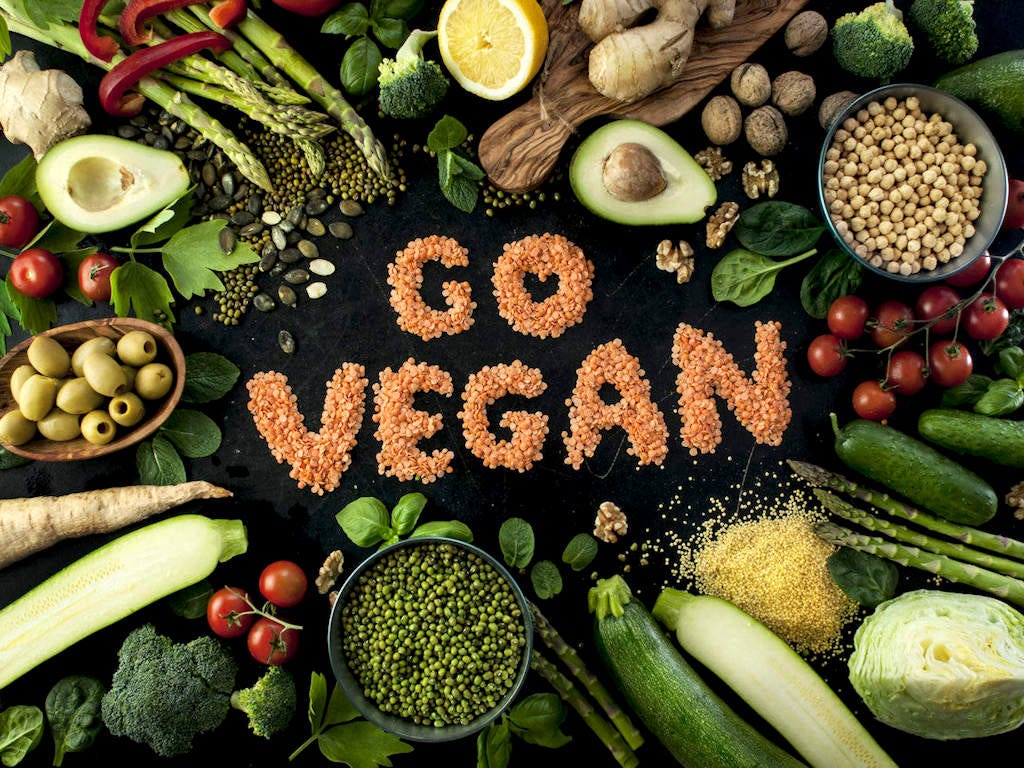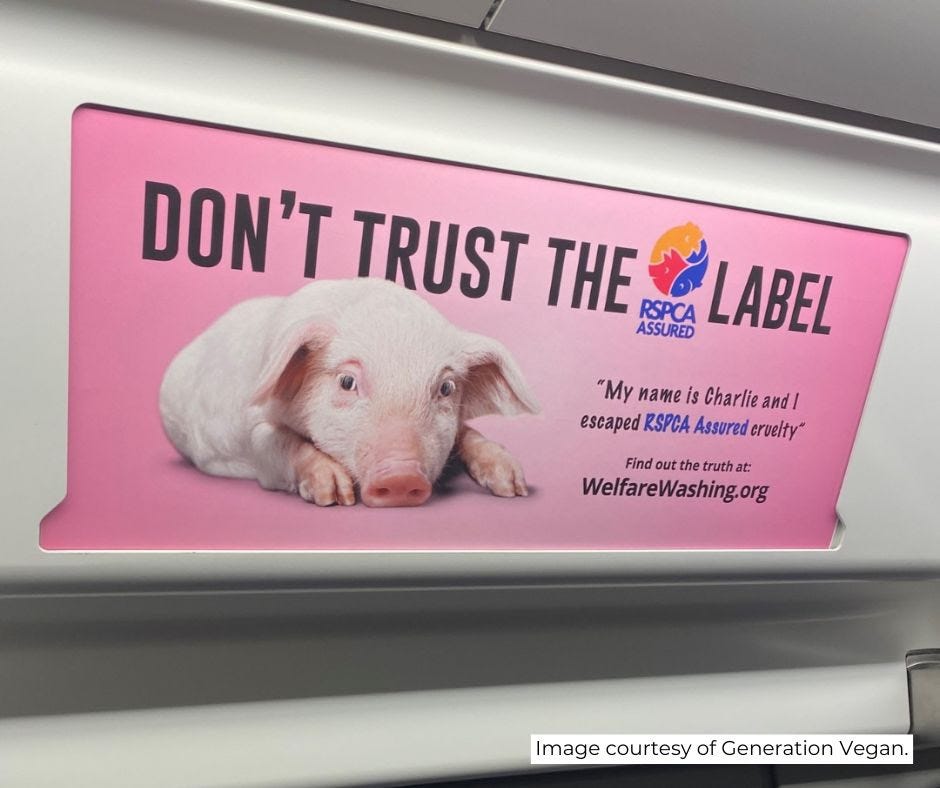Should we stop asking people to "Go vegan"?
Is our movement's dominant slogan slowing our progress towards a vegan world rather than accelerating it?
"Go vegan" has been a rallying cry for animal freedom advocates for decades. It’s a phrase that calls for action, urging people to embrace a way of living that honours and protects fellow animals. Popularised in the 1990s and early 2000s, it became a succinct slogan for a growing movement.
But is it the most effective approach? Despite its simplicity, the phrase carries challenges that may limit its broader appeal. In this blog, we’ll explore "Go vegan" through a psychological lens, examining the potential barriers to our audience receiving the message, and consider whether different approaches might be more effective.
Agency
The statement "Go vegan" is an imperative one — an instruction or command for the audience to do something. Vegans and non-vegans alike value their sense of autonomy — the feeling that we have control over our own choices and actions. There is a large body of psychological literature that suggests that imperative language can often be ineffective and counterproductive — resulting in increased anger, perceived threats to freedom, as well as alienation, message rejection, and derogation of the messenger. Psychologists refer to this phenomenon as reactance. When people feel their freedom is being restricted, they often resist the change, sometimes doubling down on their current behaviour instead. When confronted with a direct command, people may deploy a range of cognitive defences to protect their choices.
Rather than issuing directives, Animal Think Tank has found that posing questions can often be more effective. For example, in conversations or during outreach, instead of telling people why they should "Go vegan", we might ask: "What if we treated all animals with the same love and respect as animal companions?".
We saw this principle in action during an experiment we ran to test the effectiveness of different billboard messages that later appeared on the London Underground. The ads asked people to follow a link to learn more about welfarewashing. We found that the phrase "High welfare is a lie" had no measurable effect, but "Don't trust the label" led to an increase in the participants' interest in learning about welfarewashing. The difference likely came down to agency: "High welfare is a lie" tells people the conclusion we want them to reach. In contrast, "Don't trust the label" — while admittedly still directive — invites the audience to make their own judgment about the label's trustworthiness. In short, posing questions or leaving room for people to think through an issue is often more effective than delivering a command or a conclusion.
Identity
The identity associated with the word "vegan" often carries complex and deeply ingrained connotations. For many people, adopting the label "vegan" does not only signify a dietary change but marks a profound shift in identity. This can feel alien or even unappealing, as the word "vegan" has been burdened with cultural baggage. It is frequently associated with stereotypes or negative perceptions, such as vegans being judgmental, extreme, or overly militant.
The fear of becoming part of a vilified out-group is a real barrier to change. People are social beings; how we are perceived and whether we feel a sense of belonging is often a powerful overriding force. (And it's linked with our primal instincts of not wanting to be thrown out of the 'tribe'.) When an identity feels like it could isolate us or label us as a member of a controversial or stigmatised group, even the most well-meaning individuals may resist embracing it fully. Asking a non-vegan to "Go vegan" is like asking a lifelong Liverpool supporter to cheer for Manchester United — it’s not just a decision, it’s a challenge to their sense of self and belonging. A complete non-starter.
"Vegan" is associated with diet — not social justice
Another challenge "Go vegan" faces is that the general public may perceive 'going vegan' as more of a personal or lifestyle choice than a political position or boycott. Animal Think Tank conducted research analysing online conversations from 2019 to 2021 to explore how the terms "vegan" and "veganism" were discussed in public discourse. The findings revealed a clear distinction: "vegan" was predominantly associated with diet, lifestyle and food preparation, often framed as a personal choice or social trend, similar to being 'gluten-free' or 'Paleo'. It frequently appeared in contexts related to cooking and food items like burgers or cupcakes.
In contrast, "veganism" was more strongly connected to ethical principles and social justice, appearing alongside terms like "environmentalism", "activism" and "feminism." This suggests that "Go vegan" may not be the most effective message for inspiring action. If "vegan" is seen primarily as a personal lifestyle choice rather than part of a broader social justice movement, it lacks the urgency and collective imperative necessary to drive meaningful change.
When people think of our issue in terms of food and taste, this automatically reinforces extrinsic values (concern for individual wellbeing), and diminishes people’s ability to connect with intrinsic values (concern for the wellbeing of others). It also excludes our animal cousins from the frame, narrowing how people understand and connect with the issue.
What can we do about it?
We aren’t suggesting that we abandon advocating for individual change. On the contrary, it’s crucial. But perhaps there are more effective ways to frame our call to action. Instead of urging people to "Go vegan" in a way that can feel like a personal attack or an impossible identity leap, we can create a sense of inclusivity and show them that society as a whole is changing. (Reinforcing a social progress narrative.) We need to convey that people don’t need to leave their community or values behind — they are part of a collective journey. Our messaging should empower individuals to feel part of something bigger, not isolated or blamed. It should offer them the sense that their choices are connected to a larger shift in our culture. In fact, Pax Fauna's research found that the prospect of dietary change was much more palatable when framed in terms of society 'evolving together'. Some of Animal Think Tank’s qualitative research has also shown that people are much more open to the idea of change when it’s framed as a societal shift rather than an individual one. (i.e. the ‘tribe’ is changing together, rather than an individual has to risk being ostracised from it.)
So how can we create new calls-to-action that don’t activate threats to people’s sense of agency and identity? To create more impactful messaging, we can try:
posing open-ended questions or statements that encourage reflection and preserve the audience's sense of agency;
reframing our cause as a social justice issue (i.e. an act of solidarity and a boycott against cruelty) rather than a personal lifestyle choice;
and instead of centring on an identity such as "vegan", we could focus on people’s (and society’s) aspirational identities, rooted in shared values like compassion, fairness and freedom.
At Animal Think Tank we’re actively researching calls-to-action that motivate rather than alienate people. If our movement wants to move beyond the limitations of "Go vegan", what are the ways we can inspire people to evolve together toward a future where every being matters?
We’d love to hear your thoughts. Reach out to us at: narrative@animalthinktank.org.uk









This is one of the best articles on our movement that I have read in a while. Kudos to Animal Think Tank and the authors of this post.
Good stuff! I think some vegans take the harsher approach because they're tired of the bs, and know it'll get them the praise of other vegans. We like hearing someone unapologetically endorse views we hold dear - but animals need us to do more than perform for our friends.
We need to be smart and play by the rules of human psychology, even if it is more satisfying to put your foot down